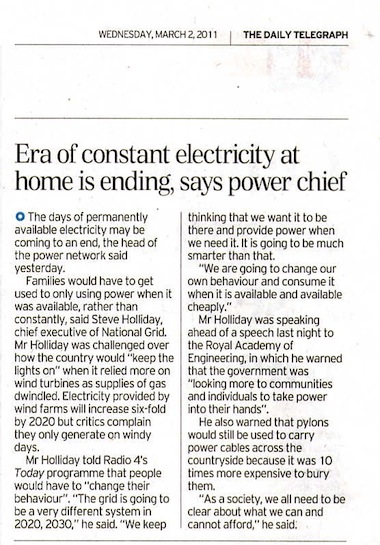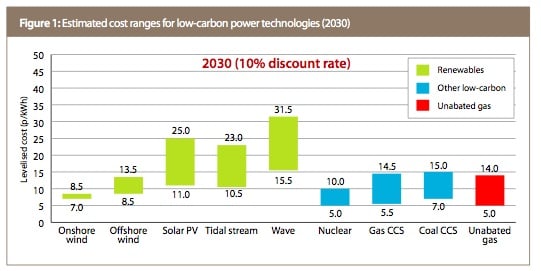Original URL: https://www.theregister.com/2011/05/09/cccomm_renewable_energy_report/
Climate Change 'wise men' recommend more nukes, power cuts
Some things don't just add up
Posted in Science, 9th May 2011 11:50 GMT
When we last met the Climate Change Committee – the statutory advisory body of "wise men" that makes global warming policy recommendations for the UK – they were urging politicians to make red meat an expensive luxury. If beef or lamb were as expensive as truffles are today, they suggested, we could save the planet from runaway global warming. This time, they're back to report on energy, with a particularly rosy set of numbers that doesn't quite add up.
Some of the recommendations will make Greens feel uncomfortable – particularly those Greens with a financial or emotional attachment to wind power. But the Puritan agenda we saw before remains. To make energy supply and demand meet, the "wise men" note, there will have to be power cuts.
"There is an issue about how the system copes with intermittent renewables (ie, keeping the lights on when the wind does not blow). Our analysis suggests, however, that a high level of intermittent renewable generation is technically feasible, as long as options for providing system flexibility are fully deployed."
This isn't some paranoid fantasy from a lone blogger. The elites have already been softening up the population to prepare for cuts for some time.
"We need to balance demand for energy with supply," says Steve Halliday, CEO of the National Grid. "That gets into smart metering, so if we need to interrupt power supply for a few hours during the day when you're not at home that's okay," he told The Telegraph last year

Softening up the public
In a a recent speech, Halliday said: "We are headed for a greater diversity in electricity generation coming from a much greater geographic spread. We have to plan for flexibility in the system to manage more intermittent energy flows because a large share of our energy will rely on when and where the wind blows."
But what the Climate Change Committee delivers is that rarest of things: a cost-benefit analysis of low-carbon energy production. And as in any cost-benefit analysis, the expensive, inefficient technologies such as wind power come out very poorly.
"Nuclear appears likely to be the lowest-cost low-carbon technology with significant potential for increased deployment; it is likely to be cost-competitive with gas CCGT at a £30/tCO2 carbon price in 2020. As such, it should play a major role in decarbonisation, provided that safety concerns are addressed," they recommend.
It's a market, but not as we know it
What they are referring to in "carbon price" is really a legally-mandated wholesale minimum price for energy. Chancellor Osborne introduced one in March, after much lobbying from energy companies with bets in nuclear and eco.
But the biases show. Renewables receive a capital cost discount rate of 10 per cent. By 2030, the committee says, "there are plausible scenarios where these other renewable technologies (eg, offshore wind, marine, solar) have become cheaper than fossil-fired generation" ... but there's a catch. The renewables would require a carbon price of £70 per tonne of CO2.
What does this mean? It effectively stops cheap energy being sold on the market, and makes energy much more expensive than it otherwise would be – thus adding to the cost of food, products and services. The Treasury says this is needed to add "support and certainty for low-carbon investment". Last month the UK pledged to introduce a floor carbon price of £16/tCO2, rising to £30/tCO2, which nevertheless adds a £9.3bn burden to UK business, according to analysts.
The Wise Men beg to differ.
"We estimate that the cost of supporting renewable electricity to 2020 will add up to 2p/kWh to the electricity price, increasing the average annual household electricity bill by around £50-60 in real terms," we learn.
Which is then contradicted a few PowerPoint™ bullet points later, when the Committee claims:
"Delivering renewable heat ambition will not increase energy bills under the current financing approach. It could require fiscal support of the order of £2bn a year by 2020."
So something plainly doesn't add up.

In summary, we know that the current batch of renewables are technologically inefficient, and therefore produce much more expensive electricity that technologically superior alternatives. To maintain their competitiveness, these renewables need both a "floor price" prohibiting us from benefiting from cheap energy innovations (such as shale or in the long-term, synthetic replacements for hydrocarbons) – which means the public pay much more than they should – and tax subsidies.
As even George Monbiot has noted, this logic produces a wealth transfer from the poor to the rich. Already, one in six households in the UK is in "fuel poverty" (or one in four households in Wales). In an age of cheap energy, this is one hardship that is completely unnecessary. By 2030, you'd be more likely to find a climate change advisor swinging gently from a lamppost, than competitive renewable energy. Committees of wise men and other bureaucrats can make recommendations – but politicians, who must implement the policies, have to face real voters.®
Andrew warmly welcomes your comments.